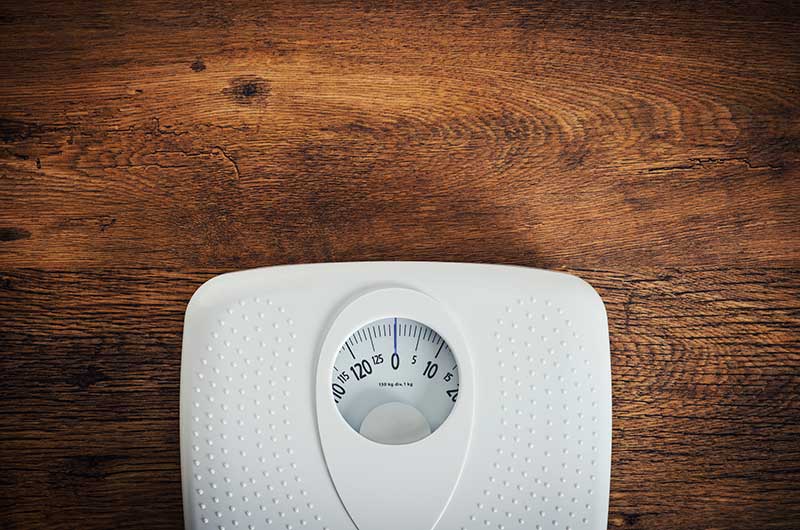
Over the past 20-plus years working with clients, one of the most common questions that come up is, “Are my hormones causing my weight gain?” The complex interactions between the many hormones in your body can indeed have an effect on your metabolism and weight. To get a better picture of your hormone health, you first have to take a look at your thyroid gland.
The thyroid is a butterfly-shaped gland that sits in the middle of the lower neck and it produces a hormone that impacts every cell in the body. The thyroid gland is responsible for regulating heart rate, body temperature and metabolism, which ultimately impacts your weight.
According to the American Association of Clinical Endocrinologists, approximately 27 million people in America suffer from thyroid disease and 13 million people are currently undiagnosed. The risk of developing thyroid disease increases with age and women are seven times more likely than men to be diagnosed.
Thyroid disease falls into two categories: hypothyroid (underactive) and hyperthyroid (overactive). Here are some of the symptoms associated with each type:
|
HYPOTHROID |
HYPERTHYROID |
|
· Extreme fatigue · Depression · Weight gain · Forgetfulness · Slow heart rate · Dry, itchy skin · Thinning hair · Voice deepening · Intolerance to cold · Irregular menstrual cycles · Infertility · Constipation |
· Irritable · Nervous · Muscle weakness · Unexplained weight loss · Vision and eye problems · Sleep disturbances · Insomnia · Racing heart rate · Intolerance to heat · Brittle hair · Frequent bowl movements |
If you have multiple symptoms and want to know if your thyroid is not functioning normally, we recommend that you see your doctor and have him or her run a thyroid panel. Most doctors will only check your TSH (thyroid stimulating hormone), which gives a fairly good picture of your thyroid health. A 2014 study published in PLoS One showed an association between blood levels of TSH and body weight. If your body is producing too much TSH, you likely have hypothyroidism; if it’s not producing enough TSH, your thyroid is overactive. The “normal” range for TSH will vary among labs and practitioners, but most endocrinologists and functional medicine practitioners feel that a narrower range helps to better diagnose thyroid disease. For some people, TSH is so sensitive, that even in the “normal” range, they still have symptoms. If your TSH levels are out of the normal range, further testing is warranted, especially to see if antibodies are being made, which will allow your medical provider to determine if your thyroid condition is autoimmune in nature. According to Dr. Datis Kharrazian, author of Why Do I Still Have Thyroid Symptoms? When My Lab Tests are Normal, most cases of hypothyroidism are autoimmune Hashimoto’s disease, where the immune system attacks the thyroid gland.
Treatment of an underactive thyroid varies based on symptoms, lab values and the type of practitioner. Some doctors will just prescribe a thyroid medication, such as Synthroid, but many functional medicine practitioners feel that this is just treating the symptoms. Adding a thyroid medication is not a tool for weight loss and can have side effects, such as bone loss. According to the American Thyroid Association, “There are many other hormones (besides thyroid hormone), proteins and other chemicals that are very important for controlling energy expenditure, food intake and body weight. Because all these substances interact on both the brain centers that regulate energy expenditure and tissues throughout the body that control energy expenditure and energy intake, we cannot predict the effect of altering only one of these factors (such as thyroid hormone) on body weight as a whole”
Other experts feel that attacking the root cause of the thyroid disease as well as nutritionally supporting a healthy thyroid, is the key to reversing thyroid disease.
Steps to Supporting a Healthy Thyroid

1. Amp Up the Antioxidants – To keep the thyroid healthy be sure to eat plenty of fruits and vegetables rich in antioxidants, such as cherries, tomatoes, bell peppers, squash and blueberries. If you suffer from hypothyroidism, you might want to limit soy and cruciferous vegetables (broccoli, cauliflower, cabbage, and Brussels sprouts), as they can reduce production of thyroid hormone.
2. Sneak in Selenium – Selenium is a mineral that acts like an antioxidant. Selenium-containing enzymes protect the thyroid under stressful conditions, while selenium-containing proteins help regulate hormone synthesis. These proteins and enzymes help regulate metabolism. Low selenium intake is also correlated with Grave’s disease, which is autoimmune-related hyperthyroidism. Selenium is found in Brazil nuts, turkey, tuna and sunflower seeds.
3. Replace Refined Grains – Refined grains (pasta, white rice, white bread, cereal) are also hard on your thyroid. Instead, choose whole grains, such as oats, buckwheat and the pseudo-grains quinoa and amaranth (both are really seeds). Also, replacing some grains with healthy fats has been shown to help balance hormones and be helpful with your thyroid.
4. Increase Iodine – The thyroid uses dietary iodine to produce thyroid hormone. Iodine is found in seaweed, fish and iodized salt. In cases of Hashimoto’s, however, additional iodine will not help the thyroid gland.
5. Consider Eliminating Gluten and Dairy – Many people suffer from a leaky gut, a condition in which large proteins like gluten (found in wheat, rye, and barley) and casein (found in dairy) pass through into the bloodstream and wreak havoc on the thyroid and cause inflammation throughout the body. Replacing these foods with gluten-free grains or going grain free, as well as choosing a2 milk products, or goat and sheep milk products can help to heal the thyroid gland.
6. Calming cortisol – Cortisol is known as a stress hormone and elevated cortisol has been associated with weight gain.
7. Exercise – Aerobic exercise helps increase and improves blood circulation throughout the body. It burns calories, increases muscle mass to boost metabolism, and enhances circulation of thyroid hormones.
While these can all help your thyroid, it is always recommended to talk to your doctor to see what is the best option for you.




 by
by 




 by
by